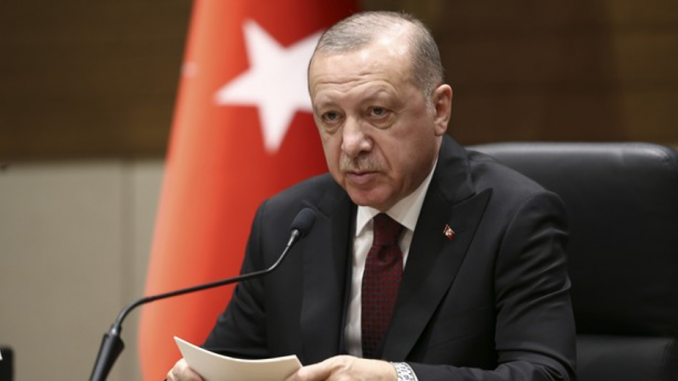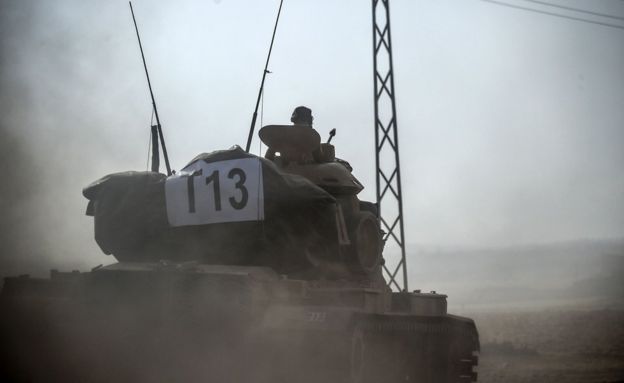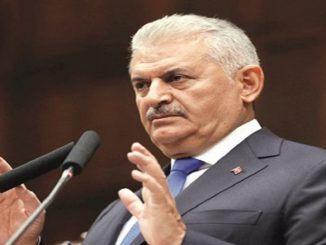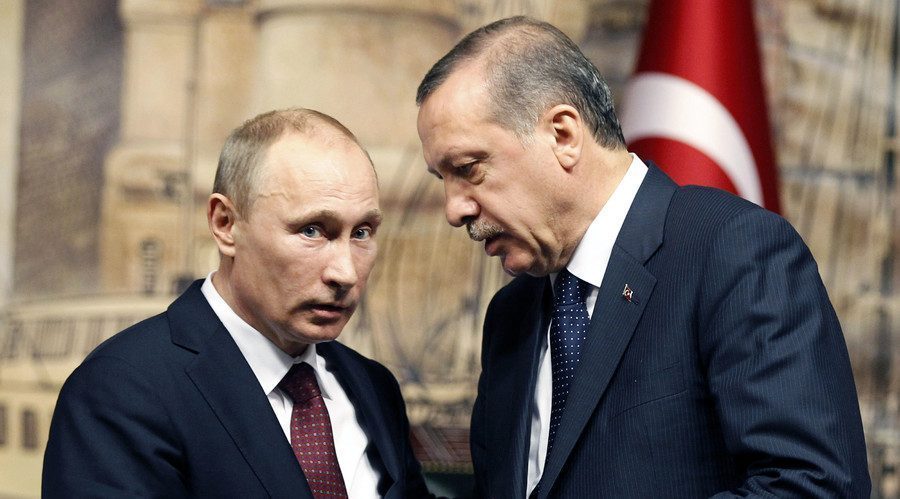
Turkey has warned Russian authorities to avoid confrontation with the Turkish military in Syria’s northwestern Idlib province, as the country is retaliating against the Bashar Assad regime for a recent attack that killed four soldiers and left nine others wounded, Turkish President Recep Tayyip Erdoğan said Monday.
On the same day, the defense ministry announced the cancelation of a scheduled Turkish-Russian joint patrol in Syria’s Ayn al-Arab province shortly after a statement by Moscow, which was later rejected by Turkish officials.
The president noted that Turkish officials have spoken with Russian authorities regarding the situation in Idlib and have told them to avoid confronting Turkish forces in the area during an operation to prevent incessant attacks by the Assad regime.
Erdogan noted that Foreign Minister Mevlut Cavusoglu has already spoken with his Russian counterpart, while Defense Minister Hulusi Akar and the head of National Intelligence Organization (MIT) Hakan Fidan are planning to discuss the issue with their counterparts.
“More importantly, if we do not reach the results desired then I will speak with my counterpart and convey to him the critical nature of the matter,” the president said.
He continued by adding that the ongoing Turkish operation is carried out based on frequent correspondence between Turkish and Russian generals on the ground.
Erdogan noted that around 30 to 35 regime troops were killed after Turkey retaliated against the Assad regime for attacking Turkish troops in Syria’s northwestern Idlib province, where the attempts to establish a cease-fire have failed numerous times.
Expressing determination to stop Assad regime attacks in the area, Erdoğan said there is an ongoing operation to ensure the safety of Turkey’s borders and the Syrian people.
“We are determined to continue our operations to ensure the safety of our country, our nation and our brothers in Idlib,” Erdogan said.
Soon after Erdogan’s statements that Turkey would continue its operations to eliminate threats near its borders, it was reported that Turkish-backed Syrian National Army (SNA) artillery targeted the positions of YPG/PKK terrorists in the village of Khalidiya and in the vicinity of Ain Issa area north of Raqqa.
“Those who test Turkey’s determination regarding Syria’s Idlib with such treacherous attacks will realize their mistake,” Erdogan said.
He noted that Turkish F-16 fighter jets and howitzers continue to carry out attacks against regime targets in Idlib.
“We are targeting around 40 places,” the president said.
Five Turkish soldiers and a civilian staff were killed and seven others were injured after shelling by Assad regime forces.
There are 12 Turkish observation posts that were established as part of a deal signed between Turkey and Russia to prevent Assad regime attacks in Idlib.
Idlib, the last opposition enclave in Syria, had a prewar population of 1.5 million. The number swelled to around 3 million with new refugee waves after it was designated a “de-escalation zone” under the Astana agreement between Turkey, Russia and Iran in May 2017. The agreement was intended to pave the way for a permanent political solution in Syria. The Turkish military set up 12 observation posts in Idlib’s de-escalation zone after the ninth round of Astana-hosted peace talks.
Although Turkey and Russia have agreed to stop acts of aggression and turn Idlib into a de-escalation zone, the Syrian regime has consistently violated the cease-fire, launching frequent attacks inside the de-escalation zone.
Following eight months of relative calm provided by the Sochi deal, the Assad regime intensified its attacks starting April 26, under the pretext of fighting Hayat Tahrir al-Sham (HTS) militants holed up in Idlib.
As a guarantor state for Damascus, Moscow is responsible for preventing attacks by the Assad regime and Iran-backed militia groups, which have repeatedly violated last year’s Sochi agreement between Turkey and Russia.
Turkey has become the primary destination for civilians fleeing Syria as a result of the ongoing conflict in the country. While supporting a political solution to the crisis, Turkey has also been fighting terrorist organizations like Daesh and the PKK/YPG in Syria, which pose a national security threat.
Ankara has long complained about the Western countries’ and the international community’s lack of support for the humanitarian crisis and the anti-terror fight in Syria, frequently claiming that the country is “left alone.”
“Turkey continues to take steps on the ground and table to ensure its own and its neighbors’ border security, re-facilitate peace in the region,” the Presidential Communications Directorate said in a statement Monday, noting that the establishment of the de-escalation zone in Idlib was one of the most important steps taken by the country, proving its determination for peace.
More importantly, the Turkish Armed Forces contribute greatly to prevent further deterioration of the humanitarian crisis in the country through its observation points in Idlib, through facilitating the coordination of humanitarian aid, observation of migration waves and prevention of civilian losses, the directorate said.
Noting that the attack on Monday aimed to interrupt the military’s goals and activities in the area, the communications directorate warned that the attack does not only violate the de-escalation agreement, but it also threatens to increase the flow of refugees fleeing to neighboring countries and causing further humanitarian crises.
The directorate also urged the international community to show “strong response” to the regime attacks in Idlib.
Joint Turkish-Russian patrol in northern Syria canceled
A joint Turkish-Russian patrol scheduled for today in northern Syria’s Ayn al-Arab was canceled after regime attacks targeted Turkish soldiers in Idlib.
Six Turkish soldiers were killed and nine others injured in shelling by Bashar Assad regime forces in the opposition-held province.
Ankara and Moscow agreed to conduct the joint patrols during high-level talks between President Recep Tayyip Erdogan and Russian President Vladimir Putin in Sochi on Oct. 22 last year.
The two countries reached a deal under which PKK-affiliated YPG terrorists would pull back 30 kilometers south of Turkey’s border with northern Syria.
The patrols were scheduled to be conducted in an area 10 kilometers into Syrian territory.
Located in northwestern Syria, Idlib province has been the stronghold of the opposition and anti-government armed groups since the outbreak of the civil war.
It is currently home to some 4 million civilians, including hundreds of thousands displaced in recent years by regime forces from throughout the war-weary country.
Turkey and Russia agreed in September 2018 to turn Idlib into a de-escalation zone where acts of aggression are expressly prohibited.
The Syrian regime and its allies, however, have consistently broken the terms of the cease-fire, launching frequent attacks inside the zone, killing at least 1,300 civilians since the agreement.
In a fresh move, Turkey announced on Jan. 10 that a new cease-fire in Idlib would start just after midnight on Jan. 12. However, the regime and Iran-backed terrorist groups continued their ground attacks.
More than 1.3 million Syrians have moved near the Turkish border due to intense attacks since the beginning of 2019.
Syria has been locked in a vicious civil war since early 2011, when the regime cracked down on pro-democratic protests with unexpected ferocity.
Since then, hundreds of thousands of people have been killed and more than 10 million others displaced, according to U.N. officials.



